tl;dr: We envision a world where neighbors support each other, dream together, and build what they need. The Relational Tech Project (RTP) is stewarding a commons where local builders can learn, share, and remix tools together to cultivate healthy relational soil in our communities.
This is the question that grounds us (the authors): What kind of home do you dream of leaving for your descendants?
For us, it’s a home where future generations feel a true sense of belonging and becoming; a place where everyone feels all their needs are met, including their need to be part of a greater story they can meaningfully shapeAt the Relational Tech Project (RTP), we believe that we the people can build the technologies we need to shape the homes of our dreams. To be successful, those technologies must help us deepen – not replace – relationships with those who also shape our homes: our neighbors. We call this type of technology ‘relational tech.’ It is made by those who embody their communities’ values and visions. It’s built with people around them to meet the real needs of the place. It can feel home-cooked, weird, unscalable, and all sorts of ways.
Relational tech doesn't only mean apps, platforms, or algorithms. Sometimes the most powerful relational tech is a clipboard at a block party or a shared spreadsheet of neighborhood needs. We’ve met plenty of relational tech builders who have never coded, don’t use smartphones, or would never refer to themselves as a ‘builder.’
That’s the cool thing about relational tech: we (that includes you, dear reader) get to define it. To do that, let’s look at an example of how it could unfold.
Take a moment and imagine a piece of land with a group of neighbors who sort of know each other.
They can at least recognize each other on the street, perhaps even stop to talk to each other while walking their dogs.
But conversations usually stay limited because people are busy or fear disrupting each others’ busy days.
One day, a neighbor decides to whip up some relational tech for people to coordinate small, purposeful groups of neighbors sharing their stories - in homes and on porches; at churches, temples, and mosques; in libraries and museums; and through performances and art.
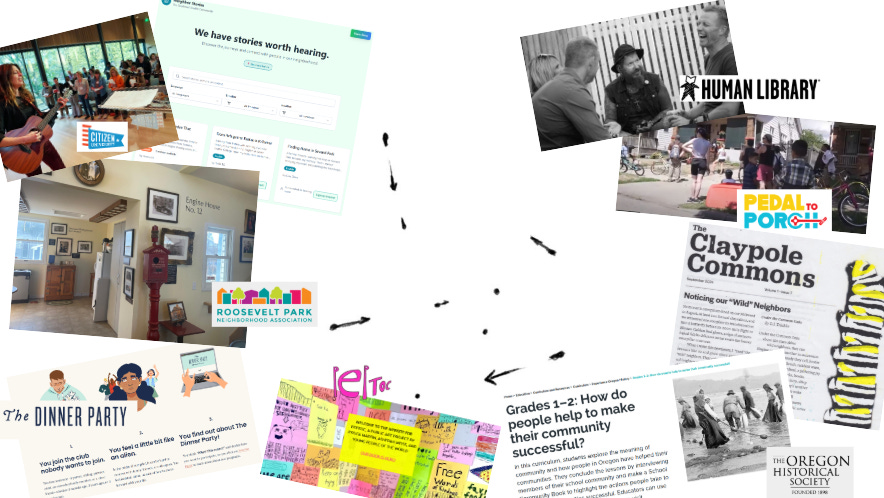
Inspired by some stories they’ve heard, a couple other neighbors realize they’ve been hesitant about asking for help because they weren’t sure who to ask. So they make some relational tech to help them share what kind of support they need and what kind of help they can offer, including borrowing each others’ gear and supplies, installing infrastructure together, and even loaning money to each other.
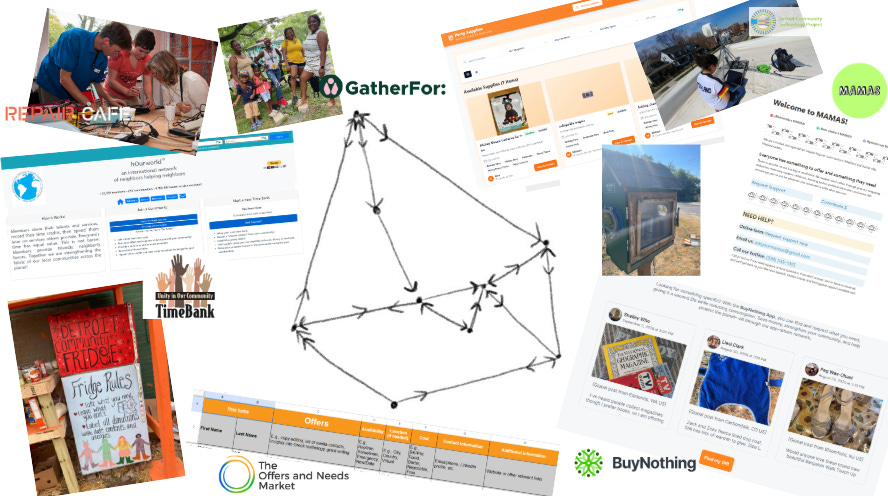
A few neighbors who have helped each other reflect on how there’s a lack of a central hub of information for what’s happening locally. So, they create some relational tech to share events and ongoing projects. They experiment with how to curate the calendar and how to meet people where they’re at, through online forums, group chats, websites, telephone poles, local papers and newsletters, and community bulletin boards.
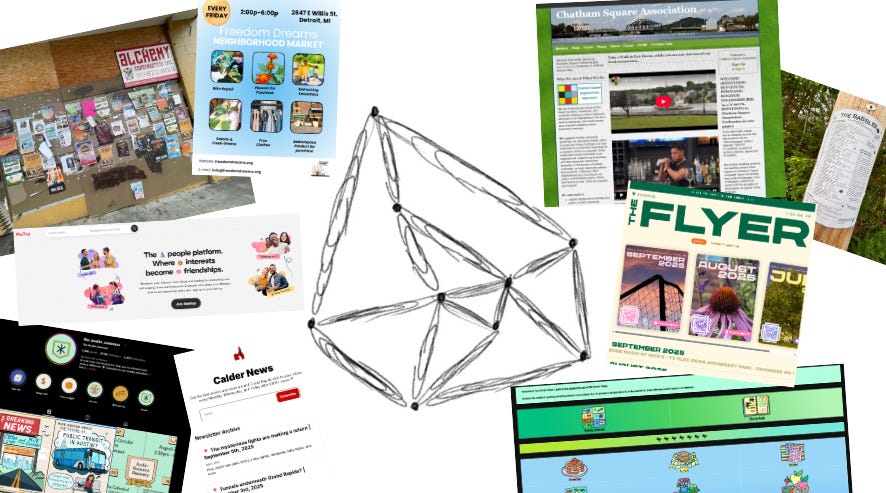
Some neighbors notice that with more interactions, there are more conflicts. They craft some relational tech for neighbors to explore their disagreements and find common ground within their differences, creating spaces for difficult conversations, mechanisms for local economic exchange, and new policies.
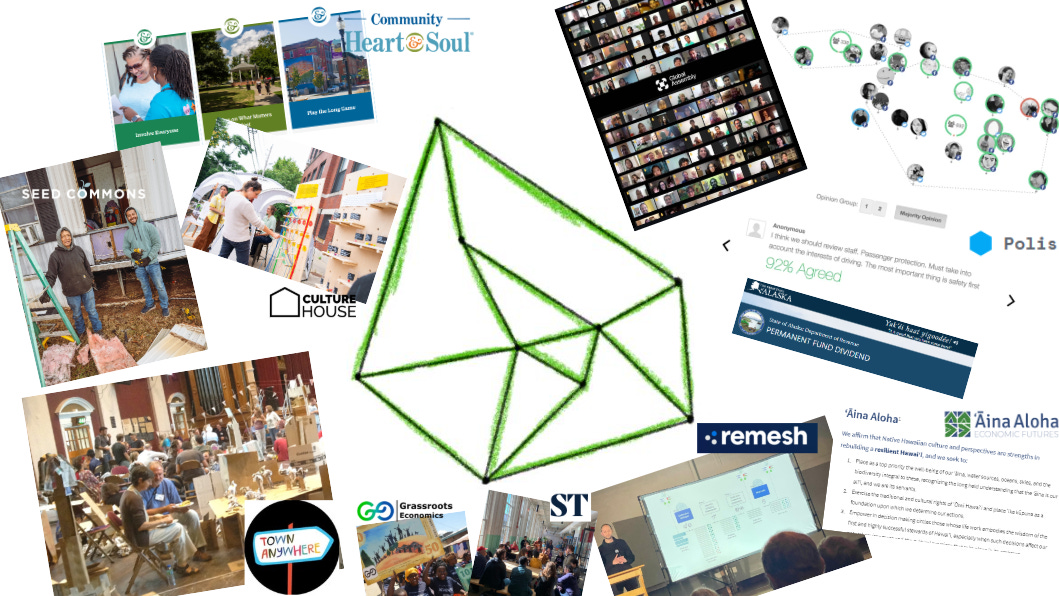
When a new neighbor comes, they feel a little like they’re intruding on a party where they were a last-minute invite.
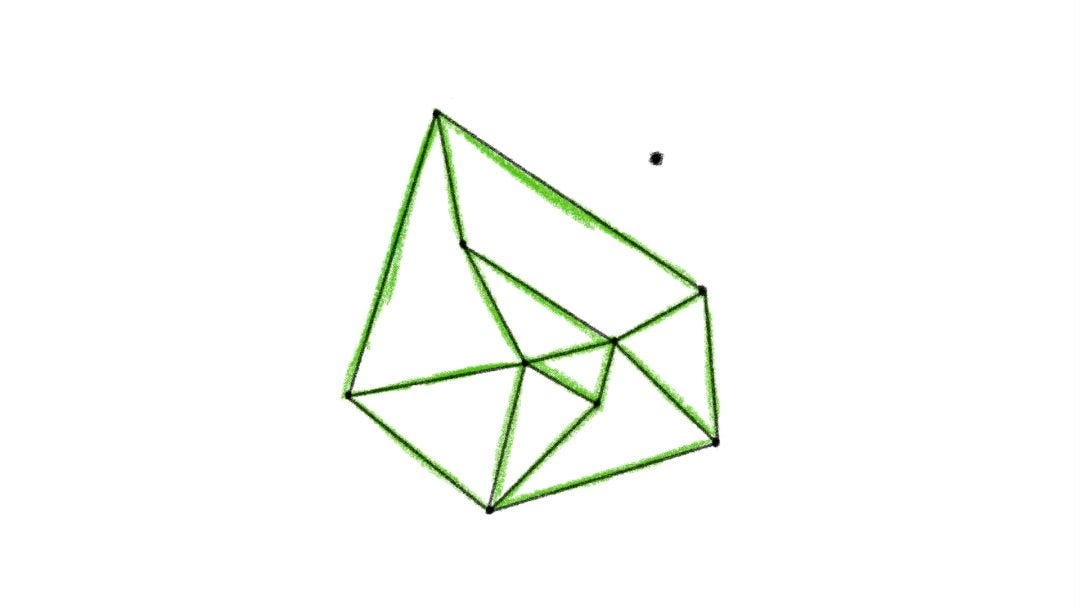
A handful of neighbors step up as ‘party’ hosts and offer some relational tech to help new neighbors land, through thoughtful invitations to join rituals, to meet people with similar interests, and to share skills and talents.
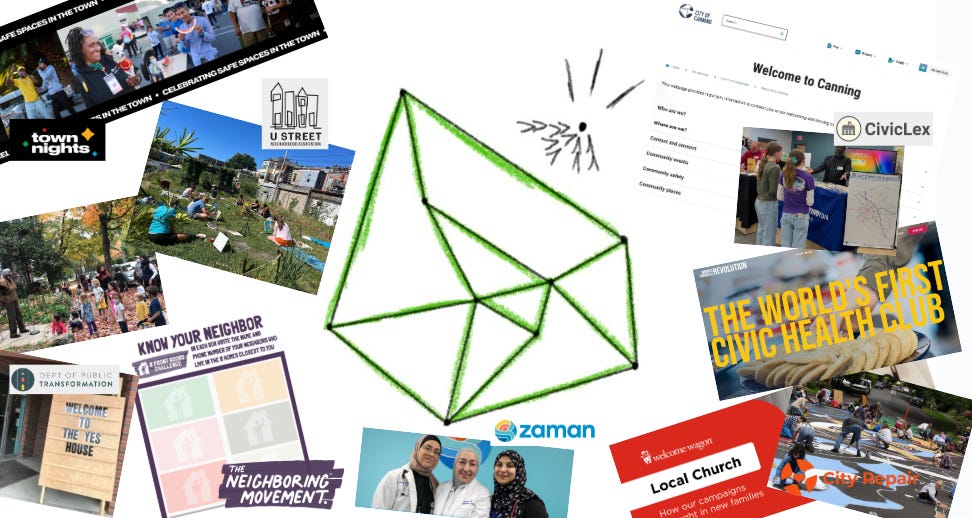
Until eventually, the new neighbor’s commitments to the neighborhood leads to a stronger, more resilient neighborhood, and the new neighbor even contributes some relational tech to the neighborhood.
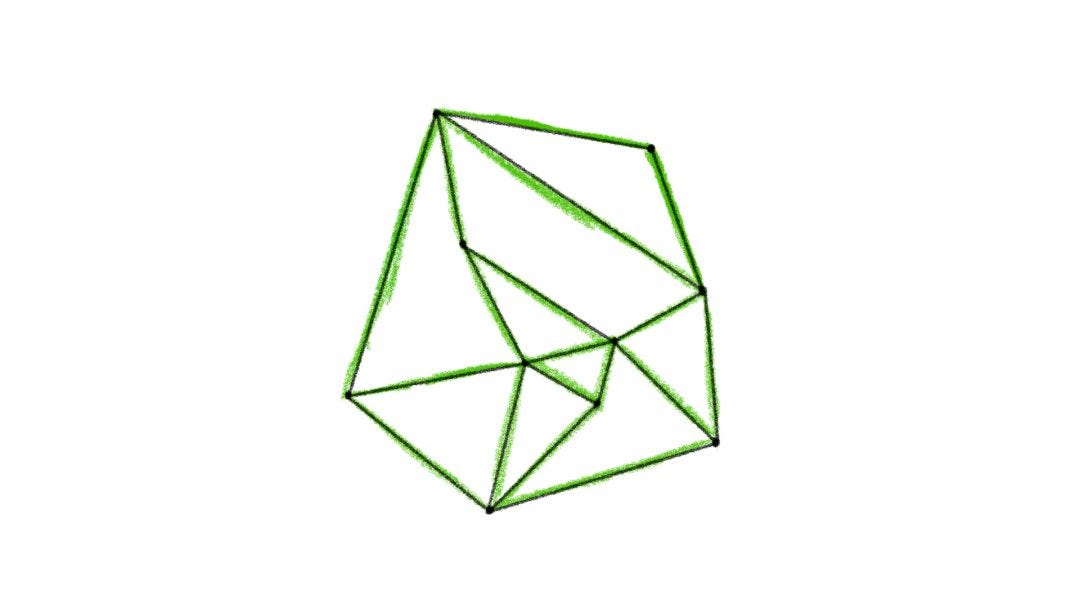
Over the years and all over the world, we’ve met many people practicing relational tech with their local communities.
Yet, many of us feel alone - caught in between the polarizing discourse of ‘tech utopias: give tech more control because it can solve everything’ vs ‘tech is evil: regulate and avoid tech because it’s the source of all problems.’
Instead, we have found a third way that celebrates when tech enables us to enhance, but not replace, relationships. We are keen to learn from each other and have a home to lay down and rest in. We yearn to craft tech as acts of care, with others we trust share this intention.
So RTP was started by and for people co-creating relational tech with their local communities, to meet each other and contribute to a shared commons. We’re a nonprofit, fiscally-sponsored project of Raft Foundation. We’re cultivating a space to support each other and braid our wisdom together to navigate the realities of making relational tech in a society that assumes tech is designed to extract data, financial gain, and scale at all costs.
When LLMs and generative AI made headlines, many of us started experimenting with how to conscientiously apply these in our communities. Along the way, we also discovered open-source models, low/no-code toolmakers, and technology stacks for local-first builders. Gifts of toolmaker recommendations, advice to co-create with multi-generational neighbors, and relational tech ideas and remixes started flowing.
We want to open this gift flow to more people.
Our vision is an RT Commons, gardened and governed by people proactively building local relational tech and supporting relational tech in other communities, which includes:
A variety of offerings for people with different levels of experience building relational tech to meet and fellowship together.
A guide to neighborhood co-creation which people can adjust based on the size, ecology, dreams, and relational and power dynamics of their neighborhood in that season.
A library of examples and stories of relational tech, with templates people can remix and adopt with their own communities.
An RT Studio tool that references different toolmakers, governance structures, and relational design patterns, for people to build with their neighbors - and evolves based on what people share about their builds.
An openness to changing our direction of the RT Commons, shaped by who else joins us ✨
Our longer-term dream is healthy relational soil all over the planet: places to land that feel nourished and nourishing to grow up and grow old in. We acknowledge relational tech is only one instrument in this dream. It’s us – the living beings now, those who came before us, and those who will come after – who are the growers.
We want to share stewardship with others taking responsibility for tending healthy relational soil with their communities, and we’re grateful to be able to continue this composting and renewing work started many generations ago.
If you'd like to join our little corner of a broader relational tech movement, reach out here or send us a note at hello@relationaltechproject.org. We love hearing stories about how relational tech has shaped you and your community.
What kind of home do you dream of leaving for your descendants? What do you want to build to get us closer?



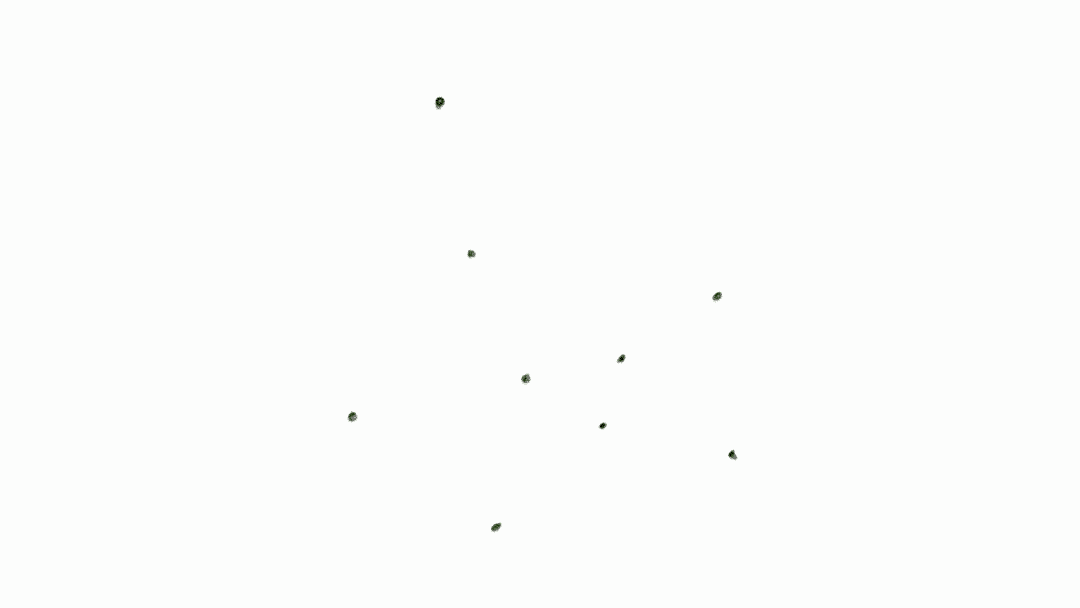
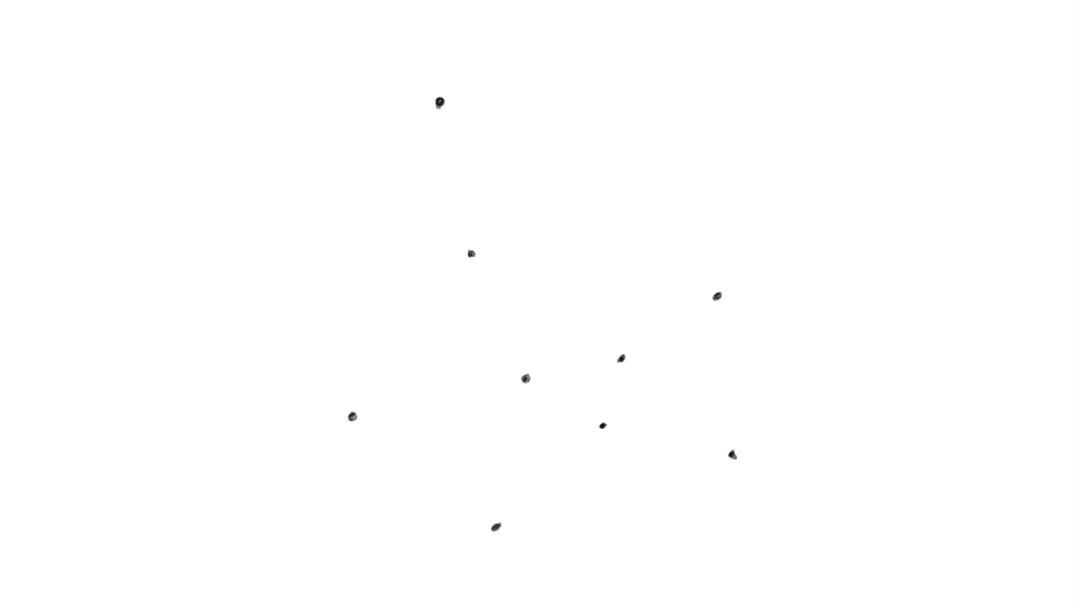
Thanks for launching this project. I've been working in the Defense Department until this Administration, and resigned my position while working for the Deputy Secretary of Defense. I'm deeply concerned about the direction of our country for our domestic security and our national security. For the majority of my early career, I worked on an issue called Defense Support of Civil Authorities where DoD provided support to other Departments and Agencies. Early career it was primarily support to FEMA, then mid-career it jumped to supporting DHS. After COVID-19, I pivoted my career to focusing on China competition issues.
The current situation in our country with domestic instability and China's authoritarian rise, requires us to return to our foundation and build more civic relationships to create the unity required to preserve democracy.
I've been on a journey to find the place and the tools to build. I live in Virginia, and I've been supporting James Walkinshaw's election, who just won with a 50 point margin, and Abigail Spanberger's run for Governor of VA. Hopefully it's a large lead as well. As, I've been on that journey, I've been organizing neighbors in monthly dinners, and I'm looking for tools like you are offering, to help expand the ways we can communicate and engage with one another.
🙌